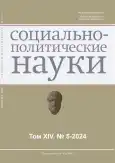Ethnopolitical conflicts: political mechanisms for their resolution
- Authors: Shevtsov V.M.1, Pivovarov Y.F.2, Vasetsky N.A.1
-
Affiliations:
- Zhirinovsky University of World Civilizations
- Scientific Research Institute (Military History) of the Military Academy of the General Staff of the Ministry of Defense of the Russian Federation
- Issue: Vol 14, No 5 (2024)
- Pages: 54-63
- Section: Political Institutions, Processes and Technologies
- URL: https://journal-vniispk.ru/2223-0092/article/view/282478
- DOI: https://doi.org/10.33693/2223-0092-2024-14-5-54-63
- EDN: https://elibrary.ru/RDUIWR
- ID: 282478
Cite item
Abstract
The article is devoted to the consideration of one of the phenomena of ethnopolitics – ethnopolitical conflict, its object, subject, forms, distinctive features, political mechanisms for resolution. In recent years, many studies of the problems of ethnopolitical conflicts have been conducted. The list of new ideas in the study of ethnopolitical problems of the countries of the world is very small: these are the concepts of a plural society, group boundaries, center-periphery or internal colonialism. With a certain stretch, they can include studies that follow the concepts of modernization, political development, but a comprehensive, interdisciplinary approach to the study of ethnopolitical conflicts has not yet been finally established either in domestic or foreign science. Ethnopolitical conflict is a type of socio-political conflict, one of the forms of manifestation of contradiction in the field of ethnopolitical relations. A new round of escalation of ethnopolitical conflicts is caused by growing globalization and further aggravation of geopolitical contradictions between world centers of power, fighting for the redivision of the world. The state of chaos and confusion that arose in the world community in connection with the events in Ukraine and the Middle East gives this process a special urgency. The state of deep socioeconomic crisis that has engulfed many countries is a powerful catalyst for the aggravation of ethnopolitical tension. Ethnopolitical conflicts always have a specific historical content. There are no technologies for their settlement that can be used in any situation and in different regions of the world, not all ethnopolitical conflicts can be resolved politically by generally accepted methods, some forms of behavior of ethnic groups of the population can enter into irreconcilable conflict with the interests of the whole society, for example, ethnopolitical incitement, preaching of ethnic hatred caused by the activities of politically corrupt ethnic elites associated with the «shadow» economy, openly and directly inciting interethnic discord.
Full Text
##article.viewOnOriginalSite##About the authors
Valery M. Shevtsov
Zhirinovsky University of World Civilizations
Author for correspondence.
Email: v.m.shevtsov@uwc-i.ru
SPIN-code: 1904-5409
Dr. Sci. (Philos.), Professor, advisor to the Rector
Russian Federation, MoscowYuri F. Pivovarov
Scientific Research Institute (Military History) of the Military Academy of the General Staff of the Ministry of Defense of the Russian Federation
Email: 9231374445@mail.ru
SPIN-code: 1677-6468
Dr. Sci. (Hist.), Professor, senior researcher
Russian Federation, MoscowNikolay A. Vasetsky
Zhirinovsky University of World Civilizations
Email: socirmsu@gmail.com
SPIN-code: 6441-1800
Dr. Sci. (Hist.), Professor, leading researcher
Russian Federation, MoscowReferences
- Bulavina M.A., Novoselsky S.O. Prospects for Russia’s military security in the current geopolitical conjuncture. In: Interstate confrontation in the context of globalization and its impact on the management of national defense of the Russian Federation. Collection. Moscow, 2023. Pp. 105–112.
- Gantamirov T.T. Interethnic and interfaith dialogue in modern Russia: Problems and prospects. New Science: Experience, Traditions, Innovations. 2016. No. 3-2 (71). Pp. 127–129. (In Rus.)
- Erokhina E.A. Ethnic diversity in the dynamics of the development of Russian Civilization. Ideas and Ideals. 2017. Vol. 2. No. 1 (31). Pp. 25–34. (In Rus.)
- Krogius N.V. Personality in conflict. Based on chess creativity. Saratov, 1976. 218 p.
- Lasaria A.O. Modern theoretical and methodological approaches to the settlement of ethnopolitical conflicts. Moscow: Moscow State University, Electronic Bulletin, 2017. Issue 63. 210 p.
- Loparev A.V., Yatsenko I.A. Ethnopolitical processes in Russia and the problem of global diasporization of the world. Power. 2011. No. 3. Pp. 119–123. (In Rus.)
- Novoselsky S.O., Moiseeva O.A., Filippova O.A. Communication policy of executive authorities with the population in social networks. Questions of Political Science. 2023. Vol. 13. No. 3 (91). Pp. 1001–1013. (In Rus.)
- Sukhanov K.A. National minorities of the Russian Federation – who are they? Proceedings of the Institute of State and Law of the Russian Academy of Sciences. 2022. Vol. 17. No. 4. Pp. 205–227. (In Rus.)
- Shevtsov V.M. Ethnopolitical conflicts: Mechanisms for their settlement: Textbook. Moscow: Publishing house “UMC”, 2024. 80 p.
- Shukshin V.S., Suvorov V.L. Hybrid wars of the modern era as a threat to Russia’s security. Monograph. Moscow: At the Nikitsky Gate, 2022. 336 p.
- Yushmanov P.N. Protection of the rights of national minorities in the Russian Federation: Problems and solutions. Sociology and Law. 2016. No. 2 (32). Pp. 112–116. (In Rus.)
Supplementary files








